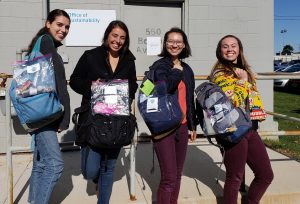A few weeks ago, Tina Woolston and Shoshana Blank attended the Association for the Advancement of Sustainability in Higher Education conference. With a community of sustainability coordinators from all over the U.S.(as well as other countries), Tina and Shoshana attended workshops, talks, and all vegan meals. Fellow conference attendees, although from different colleges and universities, have similar tasks, challenges, , and breakthroughs.
Tufts has a strong composting and Eco-Reps program. We engage with students in residence halls, as well as with faculty and staff, through the Eco-Ambassador program and Green Office Certifications. At the conference several ideas were shared that we haven’t yet tried:
- Recycling bins with a sign attached to the back of the bin and extending up, rather than the wall. This way, the bins and their signs can be moved around together. Plus, sometimes signs are not allowed to be fixed to the wall.
- Mattresses made of recycled materials. They have one firm side and one soft side, and can be sent back to the company to recycle again.
- Quieter, waterproof electric leaf blowers to avoid noise pollution and fumes. They are much safer for the health of facilities workers.
At a pre-conference talk, Boston University described their commitment to achieving 100% renewable electricity by the end of this year. Because Boston and New England in general have relatively “clean grids” (meaning we use less coal and oil for energy), financing a renewable energy project in a part of the country that uses less clean energy. In this case, BU is offsetting emissions in North Dakota.
Tufts University might consider a similar approach in an effort towards carbon neutrality on our Medford/Somerville campus.
Other highlights of the conference include:
- A discussion with sustainability directors who report directly to university presidents
- LEED certified buildings in Pittsburg
- How efforts to reduce dorm waste during move-out can reduce carbon emissions
- Internal carbon tax: how much are people willing to pay per unit of carbon on campus?
- Northeast colleges: some issues are specific to New England institutions. For example, Middlebury college can use wood as biomass for energy instead of oil, coal, or natural gas.
- Carleton College’s geothermal project: restoration rather than expansion. Alternative to steam was to replace steam with hot water
- Three University of California schools working together as part of a system to reach STARS platinum level . Reminding senior leaders that STARS is a strategic tool, not just a marketing one
- Panelists also highlighted that we should “be sure how we recycle is why we recycle.” Thoughtful and intentional messaging and recycling infrastructure is necessary to ultimately reduce input to landfills.
Conferences are a great way to reach outside of Tufts and meet people who are also interested in sustainability. If you are interested in attending a conference as a student leader, look into the Student Sustainability Leadership Weekend Conference, which will be held at the Bard Center for Environmental Policy.
November 30-December 2, Bard College, Annandale-on-Hudson NY
C2C workshops are for undergraduate students and recent graduates who want high-impact sustainability careers that can change the future, in policy, business and politics. A registration fee of $30 covers meals and housing. Led by Dr. Eban Goodstein, Director of Bard’s Center for Environmental Policy, C2C trainings focus on key leadership skills: vision, courage, developing your network, telling your story, and raising funds. Graduates of the workshops join a national network with access to continuing educational and professional opportunities, including dedicated scholarships to attend Bard’s Graduate Programs in Sustainability: Masters of Science degrees in Environmental Policy and Climate Science and Policy; a new M. Ed. Degree in Environmental Education; and the Bard MBA in Sustainability.
Details:
- Registration: $30 includes meals and housing.
- Conference begins at 5 PM Friday 11/30 and ends on 12 noon Sunday 12/2.
- Bard College is 90 miles north of New York City, and is easily accessible by Amtrak from Penn Station in NYC.
- Questions? Please contact Agim Mezreku, am6872@bard.edu



Find Us On Social Media!